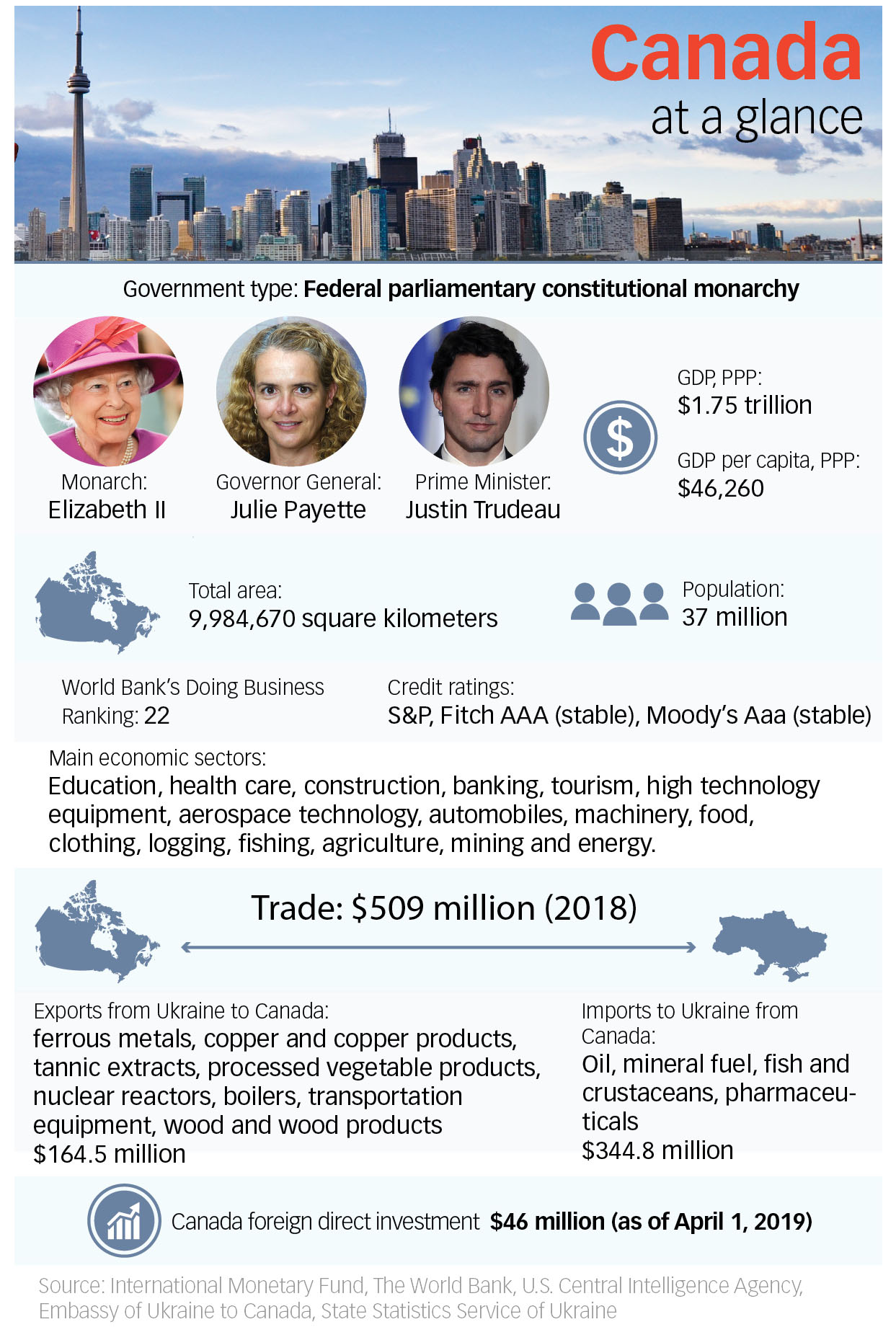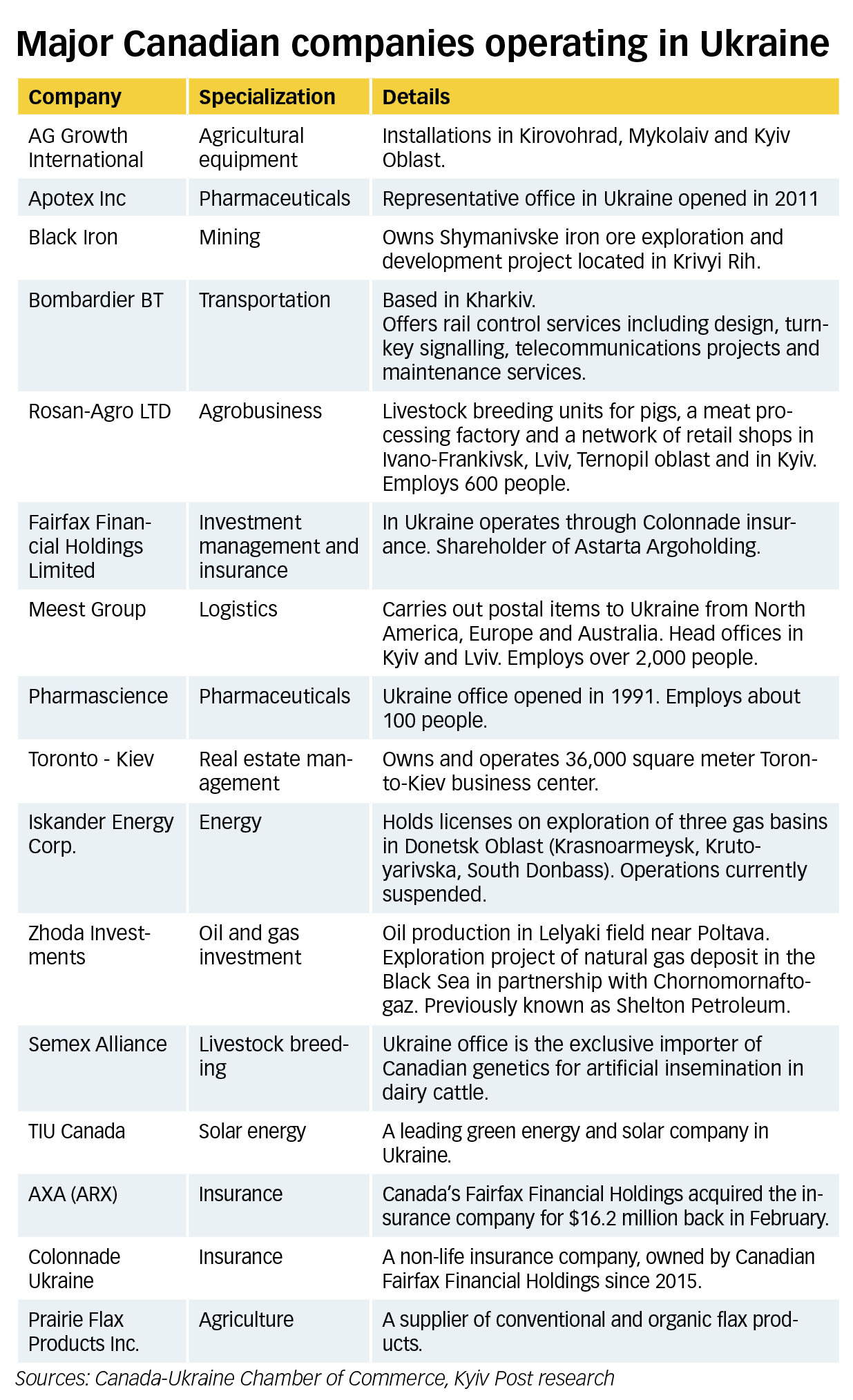When Canada last year agreed to host the 3rd Ukraine Reform Conference, which starts on July 2 in Toronto, nobody knew that it would be taking place amid such dramatic political changes in Kyiv: A new president, Volodymyr Zelensky, was elected by a landslide on April 21, and a snap parliamentary election will take place on July 21.
Consequently, many of the speakers for the three-day event are holdovers from the current government who may not be in office come September, when the new president and new parliament are expected to form a new government.
Ambassador set to leave
But even if Ukrainian ministers and government officials speaking at this year’s conference won’t be in power for long, they still will most likely have positions of influence, says Canadian Ambassador to Ukraine Roman Waschuk. After four years as Canada’s envoy, Waschuk will also be part of the landscape change in Kyiv. He is scheduled to be reassigned to Ottawa in autumn.
Canadians will have one big headliner to welcome from the Ukrainian side for the Toronto conference: Zelensky has confirmed his attendance, a clear recognition of the importance of Canada, home to 1.4 million Ukrainian-Canadians, or nearly 4 percent of the North American country’s population of 37 million people.
“We’re definitely looking forward to President Zelensky and his team and ministers who have been actively implementing reforms not just summing up, but looking ahead,” Waschuk told the Kyiv Post in an interview ahead of the July 1 Canada Day national holiday. “It’s unusual that the event is happening in the middle of parliamentary elections, but this will be bigger and broader than predecessor events. We have the full range of players able to contribute. We see it as a way to highlight key issues at a pivotal moment.”
London hosted the 1st Ukraine Reform Conference in 2017 while Denmark picked up the second one last year. Next year’s host country is expected to be announced at the close of the three-day Toronto conference on July 4.
The Toronto event will highlight a range of perennial issues, from innovation to women in power. It will also delve into decentralization, space exploration and energy issues, from traditional to renewable sources, he said.
The Canadian organizers have invited Ukrainians from regional cities, not just the capital, as part of an effort “to ensure that it’s not just the ‘Kyiv bubble’ moving to a new location talking to itself,” he said. “There’s a realization that we need a three-dimensional or maybe four-dimensional view of Ukraine, instead of the two-dimensional flattened media picture of conflict and corruption.”
He might have added Chornobyl as one of the third Cs that Ukraine is noted for globally. Even the 1986 nuclear power plant disaster is represented at the conference through the appearance of Darko Skulsky, co-producer of HBO’s hit miniseries “Chernobyl.”

State of progress
But the core topic will be the state of Ukraine’s progress in developing modern, effective and transparent governance to shed the authoritarian and corrupt ways of the past.
On the reform scorecard, Ukraine is doing better “than what Ukrainians and many foreigners give the country credit for,” Waschuk said. “I think we’ve seen a substantial narrowing of the scope for malfeasance, but we haven’t seen justice rendered for crimes committed in the past. We’re at a pivotal point now where there seems to be gathering public confidence in a generational change that would really move the country ahead. Now that might require a bit of drawing a line over some aspects of the past. You do need to see some justice done involving the most egregiously criminal acts in the past. But you can’t spend all of Ukraine’s future litigating its past.”
Waschuk also sees progress that will blunt oligarch control of the economy in the future. Oligarchs have monopolized key sectors, leading Ukraine to be one of the poorest countries in Europe, with millions of Ukrainians working abroad because of lack of opportunities at home.
“The way that the economy is developing, you are finding new sectors that haven’t been colonized by the traditional players of the past. The key example here is IT. You are also seeing a rebirth of manufacturing in Ukraine, small manufacturing…What I hope to see in the next five years is for these green shoots achieving critical mass and transforming the shape of the country.”
Canada has played a critical role in many areas, including support for banking and police reform, simplified value-added tax refunds, training Ukraine’s military to meet the challenges of Russia’s war, decentralization of government and more.
Zelensky phenomenon
Polls showed that discontent was rising with Poroshenko since 2016, fueled by sentiment reflected in recent polls showing that 80 percent of Ukrainians want radical changes. Zelensky tapped into the discontent, putting oligarchs and other vested interests on their back heels. “They are now thinking: How do we adapt to this new reality?” Waschuk observed.
Waschuk said that Zelensky’s long experience as a popular performer, touring the nation with his Kvartal 95 comedy troupe, gave him insight into the public mood. His campaign proved to be a welcome contrast, for voters at least, to the mudslinging and dire predictions of his rivals.
“I think his campaign was the only one with a spark of good-natured optimism. People tried to label it as populist. It wasn’t super policy specific. But it was cheeky and colloquial, actually talking to people’s aspirations,” Waschuk said. “Nobody else was able to muster those aspirations. Ukraine has a lot of people and it doesn’t matter what language they speak on a daily basis or region they live in. They want to have a stable, prosperous and slightly more predictable life for their families. That was something people could identify with.”
Since taking office on May 20, Waschuk notes that polls show Ukrainians are more optimistic.
“Now the optimists and pessimists match. By Ukrainian standards, that’s euphoria,” Waschuk said. He also cited polls showing consumer confidence is on the rise, which usually encourages spending and investment.
“Ukraine has needed a psychological boost,” the ambassador said. “It’s needed a sense of change in purpose.”
And for the time being, it’s found that in Zelensky, whose party is likely to win big in the July 21 parliament vote.
He has watched some of Zelensky’s comedy programs, but “was quite amazed at the number of people in the policy-making elite — who were pro- and anti-Zelensky — who never watched his programs.”
It is a sign that the elite were out of touch with average citizens.
“A lot of policy wonks and academic analysts don’t fully bathe in popular culture and popular TV,” he said, while Zelensky “had a visceral sense about what their audience’s hot buttons are, what their concerns were.”
When it comes to getting elected, the knowledge proved more valuable than “disembodied polling numbers,” the ambassador said. “Implicitly what it said to people was that anybody who satirized the system the way he and his colleagues did must have an innate or intimate understanding of the system.”

Zelensky’s reach
Whether this makes Zelensky influential outside Ukraine’s borders is not yet known. Already, however, there are signs that Ukraine’s president has rattled Russian dictator Vladimir Putin, who lives in fear of democracies and free elections.
“It’s something I’ve heard from people who have traveled from Baku to Moscow,” he said. “People, young people especially, are fascinated by this Zelensky phenomenon. (An acquaintance was) at the state institute for international relations in Moscow. The topic of most interest to young people was 2024 in Russia and the possibility of a Zelensky-like phenomenon.”
Change for better?
Waschuk expects to see a “near total” turnover in parliament among the half of lawmakers elected on party lists, since Zelensky’s Servant of the People party and rock star Syvatoslav Vakarchuk’s Golos are polling well. The other half is elected in single-mandate districts. Even there, despite elections often won by the richest candidate, Waschuk expects turnover. Overall, he thinks that candidates who are able to successfully “co-brand with parties on the rise” will make it into parliament.
At the same time, Waschuk said that he is sad to see that a lot of Euro-optimists — smart, hard-working, young people who came to power after the EuroMaidan Revolution ousted President Viktor Yanukovych in 2014 — are “not part of the mainstream of this current campaign.”
He said that attempts to organize the Euro-optimists into one group never succeeded very well. Consequently, many of them are running under different party labels or in single-mandate districts. Others, like Hanna Hopko and Mustafa Nayyem, are just leaving parliament altogether.
“Most are still young enough to draw lessons from this experience,” Waschuk said. “People can contribute from different positions. Being a member of parliament and minister is not the only way to transform and build things in this country.”
One of the lessons he hopes that politicians in Ukraine learn is to focus on building domestic political coalitions in Ukraine.
He’s also heard that many candidates for parliament are part of the Aspen Network of Development Entrepreneurs, a global network of organizations that promote entrepreneurship in emerging markets. “These are smart and well-trained people who should be quick learners,” he said, an encouraging sign that the new parliament will be made up of lawmakers who help Ukraine build on the progress of the last five years.
